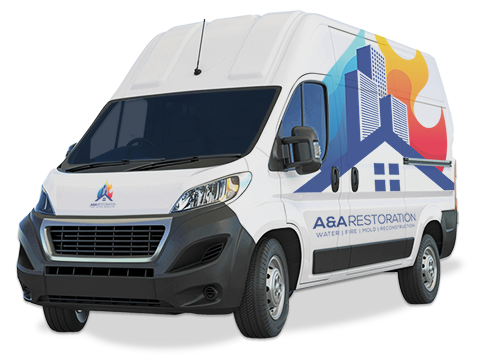If you’re dealing with water damage in your home, you may be wondering if it’s safe to sleep there. Water damage can pose health risks and create an unsafe sleeping environment if not properly addressed. In this section, we’ll discuss the potential health hazards associated with sleeping in a house with water damage and provide tips for ensuring a secure night’s rest.
When water damage occurs, it can create a breeding ground for mold, bacteria, and other harmful organisms. These contaminants can lead to respiratory problems, allergies, and other health issues, making it important to take water damage seriously and address it promptly.
To ensure a safe sleep environment in a house with water damage, there are several precautions you can take. It’s important to properly ventilate the space and control moisture levels to prevent mold growth. Additionally, regularly maintaining your mattress and bedding and practicing good hygiene can help minimize health risks.
It’s crucial to seek professional assistance and remediation for water damage cleanup. Professional restoration services can properly assess the damage and provide a thorough restoration process to ensure the safety of your home.
Remember, taking action against water damage promptly is key to ensuring a safe and secure sleep environment for you and your family.
Key Takeaways
- Water damage can pose health risks if not addressed properly
- Proper ventilation and moisture control can help prevent mold growth
- Regular maintenance of your bedding can also help minimize health risks
- Seeking professional assistance for water damage remediation is crucial
- Acting promptly against water damage can ensure a safe sleep environment
Understanding the Health Risks of Water Damage
Water damage in a house can result from various sources, such as floods, leakage, or condensation. While it can affect the property’s structural integrity, it can also pose significant health risks to the dwellers. Here are some of the health hazards that can arise from living or sleeping in a house with water damage:
| Health Risks | Causes |
|---|---|
| Mold growth | Excess moisture, warm temperatures |
| Bacterial contamination | Standing water, sewage backups |
| Respiratory problems | Mold spores, dust mites, and other allergens |
If left unaddressed, these hazards can lead to severe health problems that could compromise your quality of life. For instance, mold growth can cause allergic reactions, respiratory problems, and infections, while prolonged exposure to bacterial contamination can result in severe illness, including E. coli and Salmonella infections. Therefore, it is crucial to act swiftly and seek professional help if your property has water damage.
Tip: Always prioritize your health and safety by avoiding contact with any standing water, using protective gear like gloves, goggles, and masks, and seeking professional assistance for water damage remediation.
Tips for Sleeping Safely in a House with Water Damage
If your home has experienced water damage, it’s essential to ensure that you’re sleeping in a safe and healthy environment. Follow these practical tips to safeguard your well-being:
- Proper ventilation: Make sure that your bedroom has proper ventilation to prevent the growth of mold and mildew. Use an exhaust fan or open a window to increase airflow.
- Moisture control: Control moisture by fixing any leaks or areas of water damage promptly. Use a dehumidifier to maintain optimal humidity levels.
- Mattress and bedding: If your mattress or bedding has been exposed to water damage, make sure to replace or clean them thoroughly. Consider using hypoallergenic covers to protect against dust mites and other allergens.
- Personal hygiene: Take steps to maintain good personal hygiene by showering before bed and washing your hands frequently. This helps to prevent the spread of bacteria and contaminants.
Remember, taking the necessary precautions can help you sleep safely in a house with water damage. Prioritize your health and well-being by implementing these tips and seeking professional assistance when necessary.
Seeking Professional Help and Remediation
If your house has suffered water damage, seeking professional help and remediation is crucial to ensure the health, safety, and integrity of your living environment. Remediation includes repairing the damage, eliminating mold, and improving the air quality of your house. If left untreated, water damage can become a major health hazard.
It’s essential to hire a certified restoration service to assess the damage and provide a comprehensive restoration plan. A professional assessment can uncover any hidden water damage that may have gone unnoticed and provide solutions to avoid future problems.
Professional remediation typically includes:
- Extracting and drying all water and moisture to prevent further damage
- Removing mold and sanitizing the affected area
- Repairing and restoring walls, ceilings, and floors
- Deodorizing the affected area to eliminate any lingering odors
- Providing documentation and certification to ensure the restoration meets industry standards
Professional help can also help minimize the stress and burden of dealing with the water damage yourself. Hiring a certified professional not only ensures proper remediation but also helps you to focus on moving forward and restoring your life to normalcy.
Don’t hesitate to seek professional help and remediation for your water-damaged house. It’s the best way to ensure the health and safety of you and your family, and to prevent further damage.
Conclusion
It is crucial to address water damage promptly to avoid potential health risks and ensure a safe and secure sleep environment. Remember, sleeping in a house with water damage can pose significant health hazards, so it’s essential to take precautions and seek professional help when necessary. By following safety tips, such as proper ventilation, moisture control, and personal hygiene, you can reduce your risk of harm. Don’t hesitate to contact professional restoration services to get a proper assessment and have a thorough restoration process. Stay safe, stay healthy, and enjoy a secure night’s rest.
FAQ
Is it safe to sleep in a house with water damage?
Sleeping in a house with water damage can pose health risks. It is important to address the water damage promptly and take necessary precautions to ensure a safe sleeping environment.
What are the potential health risks of water damage?
Water damage can lead to various health hazards. Mold growth, bacterial contamination, and respiratory problems are common issues associated with living or sleeping in a house with water damage.
What tips can I follow to sleep safely in a house with water damage?
To sleep safely in a house with water damage, ensure proper ventilation, control moisture levels, regularly maintain your mattress and bedding, and practice good personal hygiene.
Why is it important to seek professional help for water damage remediation?
Hiring professional restoration services for water damage cleanup is crucial. Professionals can provide a proper assessment, offer a thorough restoration process, and ensure your home is restored to a safe and secure state.
What are the key takeaways for sleeping safely in a house with water damage?
Key takeaways include addressing water damage promptly, seeking professional help for remediation, following safety tips for a secure sleep environment, and prioritizing the health and safety of occupants.












